The High Life
Manufacturing a spectacle in Xianju
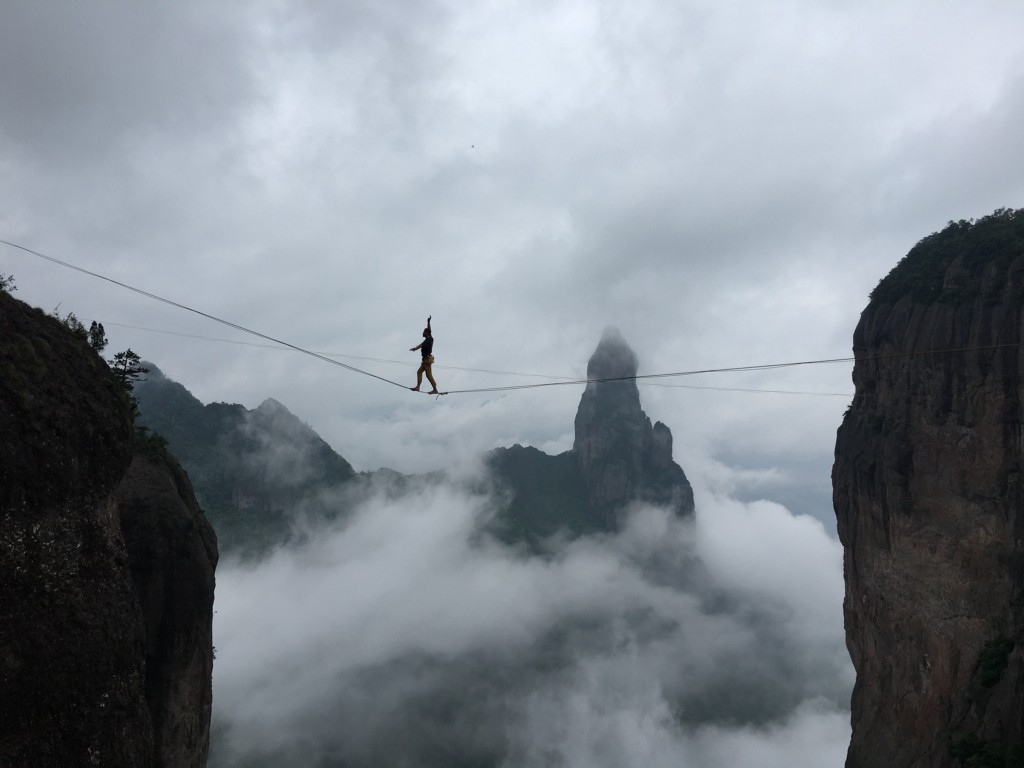
The highliners sprang into handstands and whooped as they raced around the airport on luggage carts. They were in China! For a week, they were going to walk and fall and dangle from polyester lines stretched across towers of volcanic rock in Zhejiang, an eastern coastal province. They would to sleep in a fancy hotel, eat rich meals, and receive blue envelopes of fresh, pink hundred Yuan bills. They would make predictable jokes about eating dog meat and make fun of the locals, who in turn, would photograph them as if they were wild animals, recklessly and with glee.
They were there for the 3rd Annual Shenxianju International Highlining Meeting, in May of 2016. The whole thing was a lavish PR effort funded by the Chinese tourism board of the Xianju region, and organized by outdoor sports agency, Huway.com. “Don’t let them pay for anything,” I overheard someone from Huway instruct. The contestants were honored guests, and China wanted to make a great impression. They were world record holders and sponsored highliners from the U.S. and Canada and Europe and Brazil, and they all hated the question everyone always asked: “So is highlining like tightrope walking?” (Answer: Yes, only you walk on a piece of loose webbing rather than taut wire.) There was just one female contestant — Sonya Iverson, an American — and the rest were men: lean, tall, and handsome.
They were jet-lagged but giddy as they arrived at the hotel in Xianju city; for many, it was their first trip to China. The women of the Huway team giggled as they greeted the dreamy foreigners, who laughed at the ridiculous nicknames they’d been assigned in a brochure: “Sky Elf,” “Naughty Slackliner,” “the “Limit King.” Little attention was paid to the second half of the brochure, which described the breathtaking nature of the Shenxianju Scenic Region where the highlining would take place. It showed photos of lush farm lands and ancient Chinese villages; Huway didn’t bother with English translations.

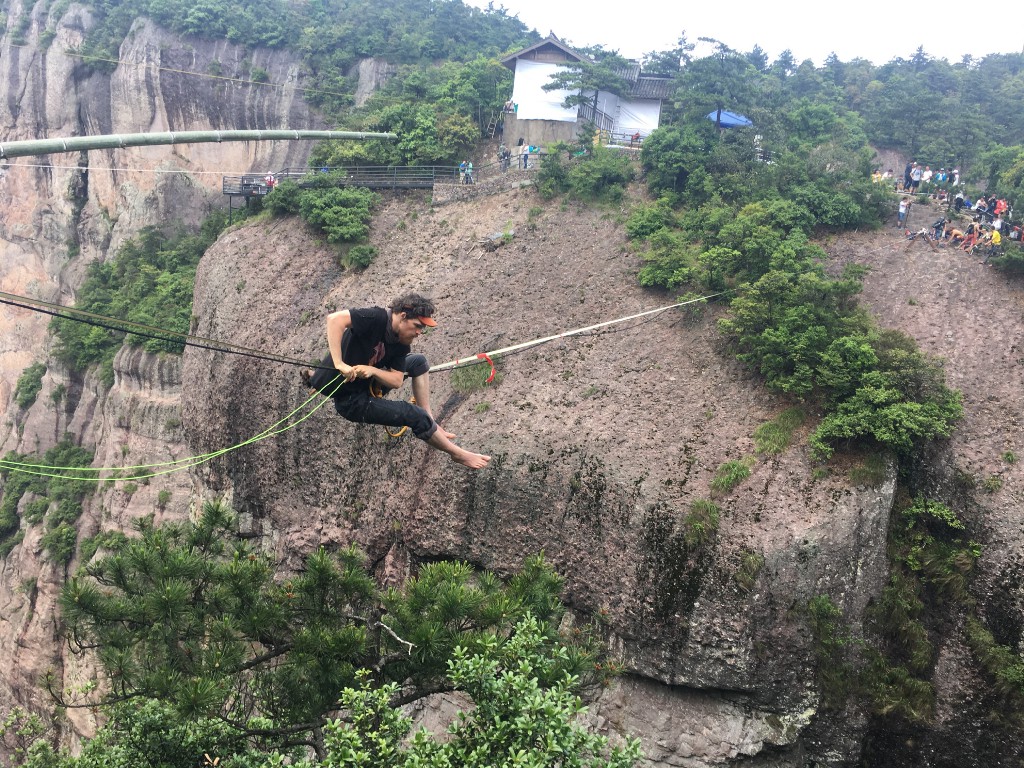
It takes an hour to get from Xianju to the sprawling, natural volcanic towers, waterfalls and streams of Shenxianju. Shenxianju was designated as a Scenic Area in 1998, but it wasn’t until 2013 (the first year the park hosted a highlining festival) that the Chinese government invested 150 million yuan (about 22 million dollars) to give it a major makeover. Despite the heavy promotion, the park remains mostly unknown to foreigners today, with exactly two English reviews on Tripadvisor and no mention in any of the usual travel guides. Affluent locals from neighboring provinces who can afford the 125 RMB entrance fee come to the park for weekend trips, and locals from Xianju county are allowed in for free.
Shenxianju was still under construction, which in China means shaping a natural landscape into easy access and profit: cable cars and guardrails with the park’s name marked across in huge red letters, a souvenir photo booth where you can buy memories with cash. For the festival, Huway had added in decorative touches: intricately carved Chinese lanterns and flags advertising the festival that hung alongside the stone stairs up the mountain. The steps ran alongside a bubbling stream until you arrived at the cable cars, which took you on a drowsy ride to the top, above the clouds and the subtropical greens.
Up high, there were two parallel 50-meter highlines set up for the speed competition. They were anchored to the distinguish volcanic rock of the region — “Shit rock,” the highliners called it, because it broke easily, which made it harder to drill anchors and rig lines. But it was beautiful: shades of rust and white and mahogany and gray, with crevices that looked like the a giant had molded the surfaces. When the fog misted over the rocks, the park did look magical, like the English translation of its name: the residence of fairies.
I didn’t have an official badge announcing me as press, but I made it past security. I’d already had tense conversations with the CEO of Huway, who regarded me with deep suspicion when I couldn’t answer her questions about what I was going to write. (Reporters Without Borders ranks China’s freedom of press as 176 out of 180, ranking only two above North Korea.) A tomboy from Huway, a baseball cap tucked on her head, was live-streaming the preparations on her phone. She called out to the finalists and beckoned them to wave. One of the younger contestants, a pale, blonde and blue-eyed European obliged, then started speaking in that singsong, gibberish mock-Chinese, which shocked me. It would have been wildly offensive in the west, but here, the girl from Huway simply giggled.
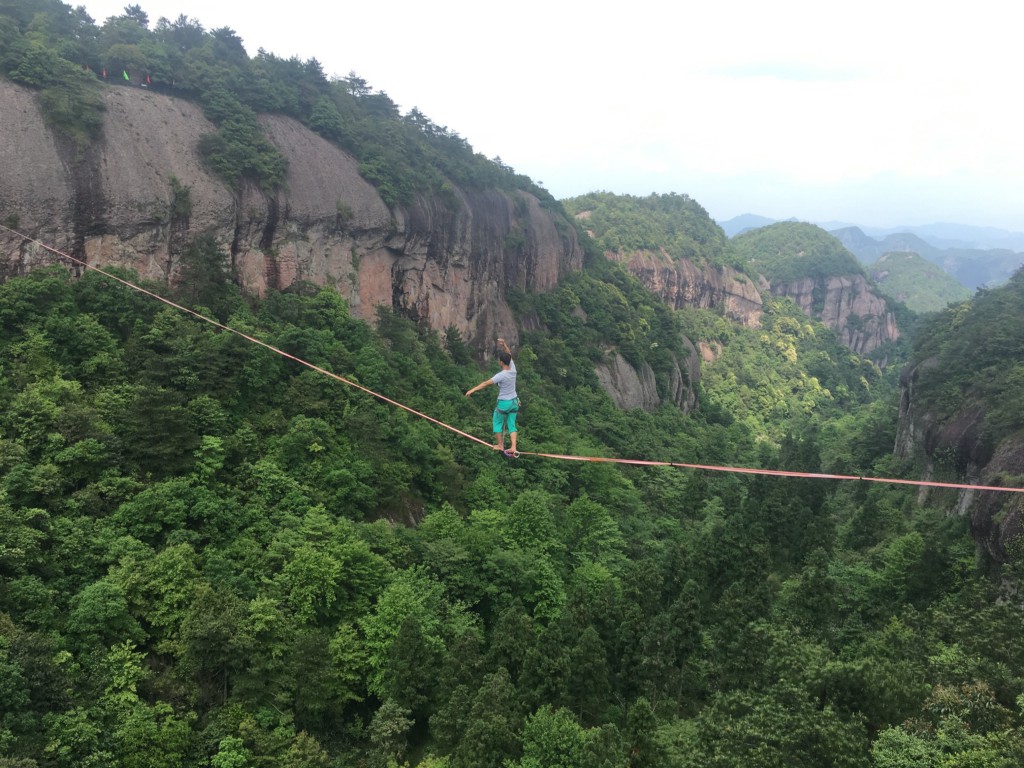
A pretty Chinese reporter from one of the major TV stations was there to narrate the competition, wearing the same gauzy chiffon blouse as the day before. The competition would be broadcast live to some 300 million viewers across 13 provinces in China. In typical fashion, the reporter made everything highly dramatic, like when two contestants tossed a coin to decide which line to walk (one of the lines was tensioned looser than the other).
The final race of the day actually was tense: Danny Mensik and Nathan Paulin, the stars who’d recently set a world record together, raced steadily, pace on par, until Danny suddenly fell and caught the line near the finish. Nathan stepped to a win. Sonya Iverson waited for the winners at a recently constructed award stage, handing them congratulatory trophies and bouquets. The winners raised posters with the amount of their winnings overhead and grinned, answering questions for the cameras.
After the competition, the mood lifted. A Huway employee wanted to try the highline, and then the CEO decided to do the same. It was impossible for an inexperienced highliner to simply step on, of course. He got clipped in on the line with a hangover, a pulley device that allowed him to glide along as if he were on a zipline. To sit up, he had to unclip himself, hang from the rope, and then climb back up to the line. He struggled to pull himself up. He spun slowly midair, dangling his pale legs.
“You can’t come back without giving us a raise!” The Huway team called out. They had all gathered around to watch. “Three days work, four days vacation!” They chanted.
“I’d rather die!” He called back, laughing.

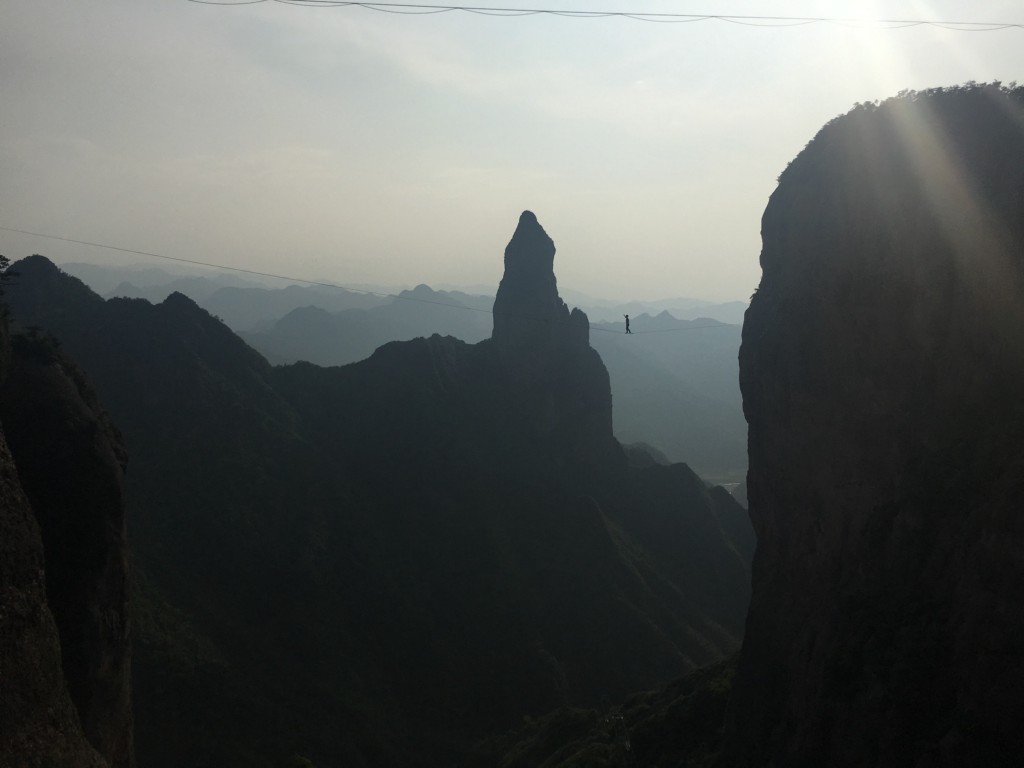
That night, everyone moved to a hotel close to the park for a big party. Two long, banquet tables split a large white tent in halves. The foreigners were on one side, in their least dirty pants and sandals, and the Chinese were on the other, in fancy shirts and complicated dresses. An entire table displayed colorful desserts and drinks, so intricately decorated they looked fake. Another table served a buffet style approximation of a Western dinner: salad, cold fried eggs, spaghetti, half-cooked steak, and heart-shaped tater tots.
The Chinese officials gave florid speeches. At the end of the table, the Chinese tapped on their phone screens while the foreigners exchanged whispered small talk. When Rio Zhang — the Chinese highliner who helped organize the event — took the stage, the highliners burst into wild, earnest applause. He had an announcement to make: he’d recently gotten married. To celebrate, he handed out red satin coin purses for everyone at the party, a spin on the tradition of giving wedding guests small favors. The purses held chocolates and Chinese figs to represent the meeting of the West and East.
Someone put on KTV (Asian-style karaoke) and roused the Huway team to sing “Xiao Ping Guo,” an infuriatingly catchy Chinese pop song. A Chinese man in a red patterned shirt danced more exaggerated moves than anyone. At last, the barrier was broken. Foreigners and Chinese laughed together, linked arms for high kicks, then a game of limbo, and then a conga line around the room. Dancers tossed flower petals into the air in drunken jubilation.
Later, a Chinese woman recruited me to announce to the foreigners that the party was over: tourists visiting from Shanghai had been complaining for the past hour. The highliners complained back: why couldn’t the tourists understand that it was just one night? “They need to open their minds!” Someone said, and someone else cut in: “I think we’re opening their minds already.” A bunch of drunk, shirtless Westerners danced wildly into the night.
I spoke to Harry Hoglinger, an Austrian highliner, about the festival’s extravagant resources. Huway covered all of the participants’ travel costs (airfare, visa, food, hotel) as well as advertising and staff (posters, flags, t-shirts, gifts, the billboards). Hoglinger had been recruited by Rio Zhang and Huway to helped out at the festival the past two years. He could see the glamorous image it was trying to project, and its problems too: the disorganization despite the grand plans, the conservatism in the face of advancement.
“I think it’s more embarrassing to see the shiny surface and the shit underneath than to admit that process takes time,” Hoglinger said. He thought China was losing its heritage, and picking up the worst habits from the West: over-construction, reckless materialism, waste. But to me, some of the highliners also seemed ungrateful. They were well paid for the trip, honored in a culture not their own, but made little effort to see China or talk to locals outside of their prearranged schedules.

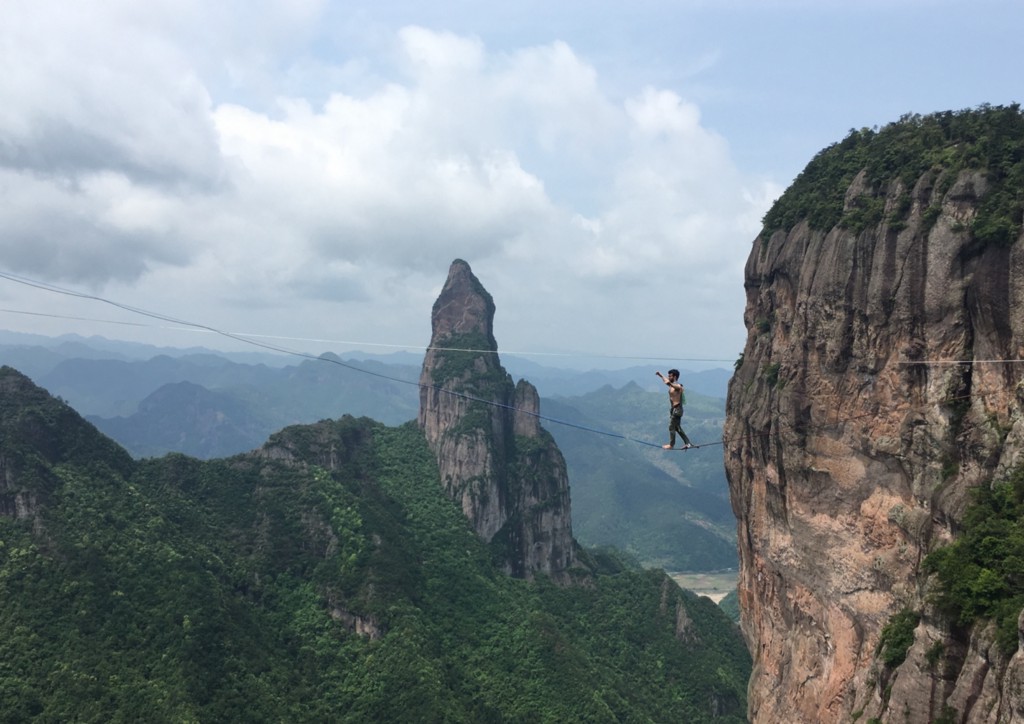
The lavish resources tapered off in the days following the televised portion of the competition. Lunch, which used to be a table full of dishes, reverted back to rice or noodles in plastic bowls. There were no more TV stations or scary security guys, just surprised Chinese tourists, exclaiming: “laowai!” (foreigners!), and: “woa bu gan kan le!” (I’m too scared to watch), as they raised their smartphones and cameras.
The weather was fickle, often rainy and gray. On a rest day, half of the highliners stayed in the hotel, turning an upstairs lounge into a yoga studio. Smaller groups went up to the mountain. One day, a bout of food poisoning hit the highliners. They curled up on benches and hid in their rooms, avoiding a sparsely attended dinner.
On my last night, I went for a walk in Xianju, ducking cars and electric motorbikes. Like every other city in China, it has a wide commercial street running down its center, full of bright lights and clothing shops. Tanned, leathery old folks gathered on wooden stools outside a video store, watching a movie playing on a TV facing the street. In the shoe store next door, a customer handed over bills like play money while an employee threw deflated balloons out on the sidewalk.
The buildings were old, with chipping tile roofs and cement doors. Some consisted of a single room — a cot, a rusty kettle, a few pieces of antique furniture. One room doubled as a cigarette shop, with a dusty, scratched display hanging up, while the owner lounged on a divan in front of the TV, visible to any passerby. Stray dogs scampered and barked. Even further back, there were no lights at all. For dinner, I ate anything (hotdogs, octopuses, tofu, lettuce, mushrooms, anything) on sticks that cost two yuan each, grilled quickly over an open fire and brushed with sauce.
I stopped in the plaza across the street, where the locals were dancing to a soundtrack of old Chinese pop. It was a variation of square dancing, a ritual I saw often in parks and plazas around China, which often looked silly: a crowd of middle-aged Chinese uncles and aunties, doing synchronized sequences to bad pop music. Tonight, though, they were dancing the waltz. The dancers moved in rhythm, their loafers and heels silhouetted against the light. It was old-fashioned, simple, dated: not the glamorous image of economic boom that China wanted to sell. It’d never appear on the tourism brochures or be broadcasted across TV stations in China. But sitting there, watching, I got a little sad that the highliners — and the rest of the world — rarely got to see it.
Laura Yan is a writer, artist, and bird president of Twitter. Her stories have appeared in GQ, Pacific Standard, Longreads, GOOD, Jezebel and elsewhere.
